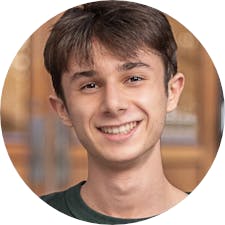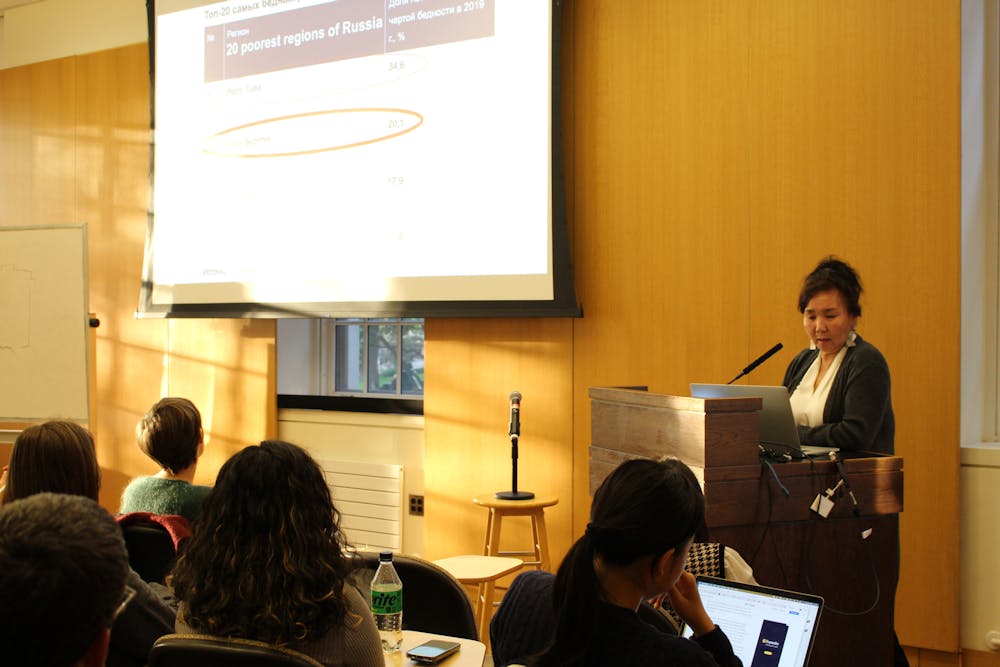Students and community members filed into Rhode Island Hall Tuesday evening for a presentation from Vera Solovyeva and Pavel Sulyandziga, two U.S.-based academics from Indigenous communities in Russia’s Siberian and Far East regions. The presentation detailed the experiences of their peoples in modern-day Russia, particularly the context of Russia’s ongoing war in Ukraine.
Solovyeva, a postdoctoral student at George Mason University, said that while much of the world may regard Russia as a monolithic country of “blond people with blue eyes,” Russia is actually a federation of federal subjects home to 40 federally recognized Indigenous groups in Siberian, North and Far East Russia.
Solovyeva, who is from the Sakha people of the Republic of Sakha, spoke in her presentation about the impacts of Russia’s invasion into Ukraine on Indigenous communities across the country. According to her research, many of the federal territories with large Indigenous populations have the highest rates of per capita deaths from the war in Ukraine.
“People in ethnic regions, they see (the) opportunity to go to war as escaping from the poverty cycle,” Solovyeva explained. “They don't have (the) opportunity to work anywhere, but they see that military schools are an opportunity to find good work.”
When Russia launched its offensive against Ukraine in February 2022, many Indigenous people of Russia were sent to the front lines of the conflict, Foreign Policy has reported. Solovyeva shared anecdotes of relatives and friends who were mobilized to join the offensive with limited notice and scrambled to gather belongings and say goodbye to loved ones.
The mobilization of young Indigenous men has been a “big tragedy” for their communities, Solovyeva said. “Who will take care of our elders? And who will take care of our land?”
In his presentation, Sulyandziga, Chairperson of the Board of the International Development Fund of Indigenous Peoples in Russia and a former member of the United Nations Permanent Forum on Indigenous Issues, shared four stories of different Indigenous groups in Siberian, North and Far East Russia. Each story illustrated the triumphs and challenges Indigenous people have faced in demanding self-determination and fair treatment from the Russian federal government.
Among these stories was one of his people, the Udege, who are native to the Primorsky and Khabarovsk krais, two regions in the far eastern part of the country.
“The last 30 years of our history has been defined by fighting for our rights, and it has been defined by war,” Sulyandziga, currently a visiting scholar at Dartmouth and the University of Maine School of Law, said in a speech translated from Russian.
Also on the panel was Charles Norchi, a professor at the University of Maine School of Law. Norchi provided an overview of the international legal doctrines underpinning the right to self-determination, along with the Russian Federation’s commitments under international law and its own domestic law to protect Indigenous peoples.
The panel ended with a performance from Pavel Sulyandziga Jr., who wore traditional Udege dress and performed a song in Udege and Russian that had been composed by his father.
The panel was organized by the Institute at Brown for Environment and Society, the Native American and Indigenous Studies Initiative and the Department of History, and was moderated by Bathsheba Demuth, associate professor of history and environment and society.
The University is hosting Solovyeva as a Dean’s Visiting Professor in the Humanities and will return in November to continue engaging with students and leading workshops, Demuth told The Herald after the panel.
According to Demuth, she and Amanda Lynch, professor of environment and society, decided to organize the panel to bring more attention to the issue of Indigenous people in Russia being sent to fight the war in Ukraine.
The panel was a “way to keep the ongoing conflict in Ukraine present in people's minds and then to increase what people understand about the dimensions of a conflict,” Demuth said. “It's complicated within Russia, and it's complicated outside of Russia.”

Sam Levine is a University News editor from Brooklyn, New York covering on-campus activism. He is a senior concentrating in International and Public Affairs.





